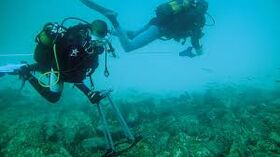Training the next generation of global scientists in marine ecosystems.
The HERITOR project offers students majoring in Biology, Chemistry or Geography a unique opportunity to engage in critical research on marine ecosystems in Cape Verde. This international program is a collaborative initiative between Bridgewater State University, the University of Cape Verde, and the non-governmental organization, Biosfera Cabo Verde. The program’s goal is to train the next generation of global scientists dedicated to mitigating human impact on our planet.
About HERITOR

The HERITOR project is an international research collaboration focused on marine ecosystems research and community outreach in Cape Verde. Through this initiative, BSU students collaborate with students from Cape Verde to work alongside scientists from Biosfera Cabo Verde and the University of Cape Verde (Uni-CV). Our mission is to build capacity for ecological monitoring, establish biodiversity baselines, and develop crucial scientific and leadership skills in students, all while fostering science communication and community engagement in both Cape Verde and the U.S. The project acronym HERITOR reflects our overall focus on training the next generation of global scientists to mitigate the impact that human activity has on the planet — for all who will inherit the Earth.
Goals of HERITOR
- To build capacity for ecological monitoring of marine ecosystems in Cape Verde.
- To generate a baseline for biodiversity before the release of waste discharge from an aquaculture plant and continue post-impact monitoring to assess ecological changes.
- To develop science content, research, technical, collaborative, and leadership skills in graduate and undergraduate students.
- To support science communication among undergraduates through presentations, manuscript authorship, and STEM outreach.
Research Focus
Our research centers on understanding and protecting the seashore biodiversity of Cape Verde, an archipelago of ten volcanic islands in the Central Atlantic Ocean. These unique ecosystems face various anthropogenic pressures, including coastal urban development and aquaculture. Fellows will be assigned to one of three research projects (two Fellows per project). Research will primarily focus on establishing pre-impact biodiversity baselines and monitoring the effects of waste discharge from a shrimp aquaculture plant in Baía do Calhau, São Vicente island. Projects will involve studying continental-shelf vertebrates, subtidal benthic macroinvertebrates, and intertidal macroinvertebrates and sessile macroalgae.
Our Team & Collaborators
The HERITOR project is an international collaboration between the Center for the Advancement of STEM Education (CASE) and the Department of Biological Sciences at Bridgewater State University, the Departments of Biology, Education and the House of Science at University of Cabo Verde (Uni-CV), Cabo Verde, and Biosfera Cabo Verde, a non-governmental organization central to conservation efforts in Cabo Verde.
The HERITOR Project is funded by National Science Foundation International Research Experience for Students award #2504650.